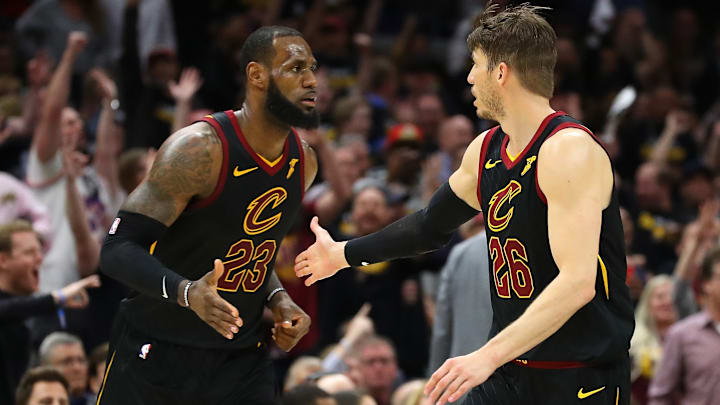There is no argument against LeBron James being the greatest player the Cleveland Cavaliers have ever employed.
James holds countless franchise records and brought Cleveland to five total NBA Finals appearances through 11 years with the team. The 2016 Finals win will always be cemented in Cleveland sports history, and NBA history at large.
Still, by the time that LeBron left for the Los Angeles Lakers in 2018, it was time for the two parties to part ways. While James soon won another championship with the Lakers, Cleveland was put in a better position after his exit. James was coming off yet another Finals run with the Cavs against the dynastic Golden State Warriors, his and the team's fourth-in-a-row. Despite the loss, it was one of James' greatest playoff campaigns of his career.
When LeBron signed elsewhere, Cleveland suddenly went from a perennial contender to a rebuilding franchise at the bottom of the Eastern Conference. Had LeBron stayed, the Cavs may have continued reigning over the East, but it was nonetheless needed.
The beginning of the end
LeBron's final season with the Cavs was tumultuous at best. During the offseason, Kyrie Irving suddenly demanded a trade. The Cavaliers spent the summer searching for the best trade partner, but inner drama and mismanagement led to Cleveland accepting an underwhelming downgrade for an injured Isaiah Thomas and company.
Cavs fans were left hoping for the best while simultaneously daydreaming about what could have been. The Cavaliers core was aging, and James and Kevin Love were left playing without the expected third star for the majority of the season. Cleveland attempted to build around them with veteran talent such as Derrick Rose and Dwyane Wade, but neither former star fit into what the Cavs needed.
By the time the trade deadline buzzer hit, the Cavs had already ended the Thomas experiment, trading him to the Lakers for Jordan Clarkson and Larry Nance, Jr., two younger prospects with good potential. As for Wade, the three-time NBA champion went back to the Miami Heat for virtually nothing but a handshake. Rose was out for Rodney Hood, and Iman Shumpert was swapped for George Hill.
With an entirely new roster, the Cavaliers lost their core and their supporting cast. They had no true identity any longer, and there were no answers in sight. James and Love still put together a strong performance with one another, but the team was only a contender because of the man wearing number 23.
The Cavaliers ended the regular season with the second-worst defensive rating in the NBA and were headed for a painful postseason. While the front office could have tried to salvage something to keep LeBron, the King of Cleveland was ready to move on again.
The Cavaliers were forced to pivot
Many can look back and see how the Cavaliers have emerged as a contender again in just six years. The Cavs completed a wildly fast rebuild and are in the midst of the best start to any season in team history.
By the time James left, Cleveland was a directionless franchise holding onto an aging core. LeBron James was still the greatest player in the league, but there was no foundation around him in Cleveland. The Cavs had no paths to build one, either, making the departure the best route necessary. It forced the Cavaliers to build a new identity rather than clinging onto what was already gone.
The Cavaliers, regardless of James' presence, were not the same team they were one season earlier. Once Irving's fractured relationship with the franchise led to a failed trade, the Cavaliers were destined to enter a rebuild.
LeBron James leaving the Cavaliers in 2018 was the best thing that could have happened. Rather than waiting until the bitter end composed of countless disappointing seasons, the Cavaliers had an opportunity to get a jump start on the rebuild. With the selection of Collin Sexton in the 2018 draft, the Cavs had an exciting scoring guard as the result of the Irving deal.
Cleveland slowly turned their remaining assets into future ones. Kevin Love stuck around for a while as a veteran leader as the front office strategically moved players with eyes on the future. Acquiring Jarrett Allen for nearly nothing was an unexpected strike of gold. Eventually, the Cavaliers turned Nance into Mitchell through the Lauri Markkanen deal.
For a few years, the Cavaliers did nothing but lose on the court. There was a drastic fall off from the second James era to the second Post-James era. This time, though, the Cavaliers were much better in their response. They added talent in the draft, from Darius Garland to Isaac Okoro to Evan Mobley, and found supporting talent over the years such as Dean Wade.
Even if the Cleveland Cavaliers' rebuilding efforts didn't lead to their current place in the league, they found a direction and committed to it. Their rise to prominence was not by accident. The Cavs made deliberate, calculating decisions to maximize their value and position themselves for a new era of greatness. Now, Cleveland basketball is once again making history and breaking records, this time with a young and developing core.
